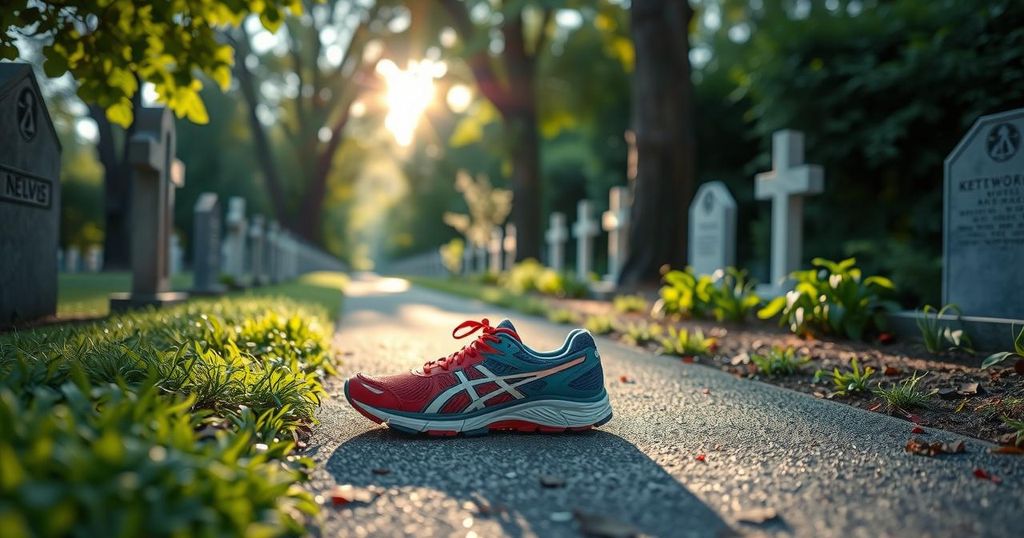Zimbabwe’s Cemetery Fitness Club: Outpacing Death Through Exercise

A fitness club in a Harare cemetery attracts older adults like Nelly Mutandwa, who exercise to combat diabetes and other non-communicable diseases. As NCDs surge in Zimbabwe, these unconventional workout locations reflect community-driven responses to health challenges. With rising concerns about obesity and unhealthy diets, older Zimbabweans are setting an example for healthier lifestyles amid limited resources.
In Zimbabwe, a unique fitness club located in a cemetery is attracting older adults seeking to improve their health. Participants like 65-year-old Nelly Mutandwa engage in various exercises, viewing their workout as a means to manage health issues like diabetes. Mutandwa and fellow members exercise among graves, asserting their determination to live longer through daily physical activity.
The growing prevalence of non-communicable diseases (NCDs) across Africa, including diabetes and heart disease, has led many older Zimbabweans to prioritize exercise. With few local gyms available, these individuals are finding alternative workout venues, such as highways and abandoned railways, reflecting a creative response to limited resources in their communities.
According to the World Health Organization, NCDs are responsible for 41 million deaths annually, accounting for 74% of global fatalities. In Zimbabwe, these diseases represent approximately 40% of annual deaths, with an upward trend expected as they begin to surpass communicable diseases by 2030.
Dr. Johannes Marisa, a public health expert in Harare, noted a concerning rise in NCDs among younger populations, attributing this to sedentary lifestyles exacerbated by screen time and unhealthy eating habits. Fast food growth in urban areas contributes to obesity and other health issues, especially for those facing food insecurity due to climate-related droughts.
To promote healthier diets, Finance Minister Mthuli Ncube introduced a 0.5% tax on junk food sales, aiming to address the rising prevalence of NCDs in Zimbabwe. As older adults like Mutandwa take action through exercise, they serve as examples for their peers, combatting health issues with a proactive approach.
The Commandos Fitness Club, led by Joseph Nekati, offers support to members like Susan Gomo, who successfully reduced her weight and improved her health conditions. Gomo explained how visible results can encourage others to embrace exercise, counteracting a culture of inactivity among peers.
Mutandwa’s decision to join the cemetery fitness group emerged from her desire for a safe, practical workout space. After struggling to find suitable exercise locations at home, she found the cemetery’s spacious and serene environment ideal for improving her health.
As the cemetery transforms into a symbol of resilience and health for Mutandwa and fellow members, they remain hopeful for future improvements in local fitness infrastructure that would support their efforts.
The article highlights the increasing trend of exercising in unconventional locations among older adults in Zimbabwe, particularly in response to the rising threat of non-communicable diseases such as diabetes and heart disease. With limited access to formal fitness facilities, older individuals are resorting to open spaces like cemeteries to conduct their workouts, showcasing the innovative ways communities are tackling health challenges amidst urban lifestyle changes and limited resources.
The rise of unconventional fitness groups in Zimbabwe, particularly in cemeteries, illustrates a growing commitment among older adults to improve their health and manage chronic conditions. Factors like the increasing prevalence of non-communicable diseases and limited access to traditional exercise locations drive this trend. As these fitness initiatives gain traction, they not only aid individual health but also foster a supportive community environment, potentially inspiring more individuals to prioritize physical activity and healthful living.
Original Source: abcnews.go.com







